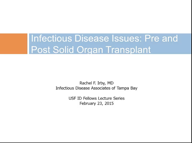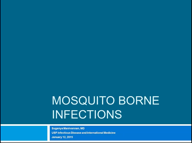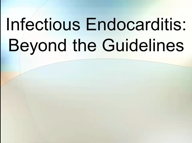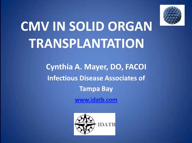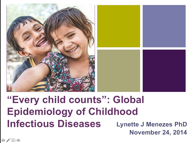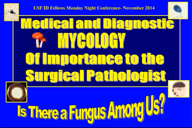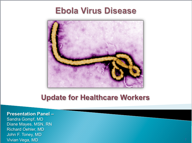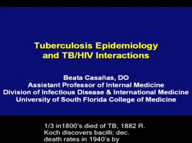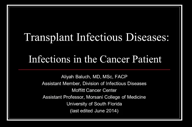Dr. Rachel Irby speaks about infectious disease issues in heart, liver, and kidney transplants. She emphasizes the importance of patient history, including birth, travel, vaccines, employment, and surgical history. She also speaks about infection serologies and how to treat pre-existing infections, infectious contraindications for transplant, and vaccinations.
Archives
Mosquito-Borne Infections
Dr. Suganya Mannivannan speaks about mosquito-borne infections, including malaria, dengue, Chikungunya, Yellow Fever, West Nile Virus, Filariasis, and Encephalitis viruses. She speaks about the lifespan of malarial parasites and transmission vectors, symptoms, protective factors, and treatment. She touches on current Phase I trials for malaria vaccines. She continues on to review epidemiology, vectors, symptoms, diagnostics, and management for each infection. Mosquito attributes, including life cycles, reproduction, and feeding are discussed, as well as preventative techniques.
Infectious Endocarditis: Beyond the Guidelines
Dr. Kaley Tash speaks about the diagnostic considerations, complications, and prevention of infectious endocarditis and its complications. Echocardiogram is the mainstay of diagnosis, as diagnosis from skin and conjunctival manifestations are rare in the modern age. She touches on etiological pathogens, laboratory findings, She speaks about complications: valve perforations, abscesses, cardiac effusion, infarctions, renal abscesses and renal failure, and septic emboli to the lungs. Complications can also occur in the CNS and peripheral vascular system. IV drug users and elderly patients have the highest risk of complications and are the most difficult to treat. She touches on different options for treating these high-risk groups, including sealed PICC lines and surgical treatment.
CMV in Solid Organ Transplant Recipients
Dr. Cynthia Mayer speaks about the management of cytomegalovirus infection in solid organ transplant recipients. About 50% of the US population has been exposed to CMV by the time they are young adults, and it is the most common viral infection affecting solid organ transplant recipients. Dr. Mayer discusses the differences between CMV infection and CMV disease, and the importance of distinguishing the two when assessing end-organ damage. She speaks about mechanism of infection, risk assessment for donors and recipients, diagnosis, management, and prophylaxis. She also touches on the management of Ganciclovir resistant CMV.
Global Epidemiology of Childhood Infectious Diseases
Dr. Lynette Menezes speaks about the childhood infectious diseases that produce the highest global burden of disease (years of life lost due to premature death or disability). Infectious diseases cause about 40% of deaths in children under 5 years of age, many in sub-Saharan Africa. In 2010, the estimated global disease burden due to infectious diseases was 610 million disability adjusted life years. She focuses specifically on acute respiratory infections, diarrheal diseases, measles, malaria, and HIV. She also discusses strategies for disease control, including handwashing and vaccination.
Medical and Diagnostic Mycology of Importance to the Clinician and the Surgical Pathologist
Dr. Ramon Sandin reviews the identification, diagnosis, and management of infectious fungi. He covers yeasts and molds that are clinically relevant to the practicing clinician, including systemic dimorphic species of Histoplasma, Blastomyces, Coccidioides, Paracoccidiodes, Sporothrix, Penicillum, and molds involved in chromoblastomycosis. He also discusses subcutaneous mycoses and opportunistic infections. He reviews laboratory diagnosis, histopathologic stains, and cultures. Affiliated with Moffitt Cancer Center, he also discusses mycoses in the setting of immunocompromise or malignancy.
Ebola Update: One Year Later
Recorded in November 2014, Dr. Vivian Vega presents an update on the 2014-2016 West African Ebola outbreak adapted for both healthcare workers and patients. She speaks about the epidemiology, clinical manifestations and the effect of the outbreak on other public health issues such as malaria and TB. She also talks about the implications of the outbreak in the global community, the possibility of pandemic spread, and reviews four patients diagnosed with Ebola in the United States. Finally, Dr. Vega discusses risk assessment for patients exposed to the virus as well as its diagnosis and management. As the last major global outbreak, a look back to 2014 adds some insight into how we are managing the current Coronavirus pandemic.
Tuberculosis and TB/HIV Interactions
Dr. Beata Casanas presents an update on the epidemiology, stages, diagnosis, and management of tuberculosis. While the absolute number of TB cases has decreased, the rate of decrease has slowed. Dr. Casanas also touches on considerations required for multi-drug resistant TB. She discusses different diagnostic tests, including PPD, sputum studies, and interferon-gamma release assays, and the differences between active and latent TB. She also discusses TB co-infection in HIV-infected patients, as both infections independently accelerate the progression of the other.
Sepsis: The Saga Continues
Dr. Toney discusses recent developments in the management and treatment of sepsis.
Transplant Infectious Diseases: Infections in Cancer Patients
Dr. Aliyah Baluch, an infectious diseases physician at Moffitt Cancer center discusses common infections that affect cancer patients. She reviews epidemiology, risk stratification for neutropenic fever, monoclonal antibodies, and antibiotic resistance in the setting of the immunocompromised cancer patient. She also reviews management of neutropenic fever, common pathogens, and selected syndromes – nodular pneumonia and ecthyma gangrenosum.
